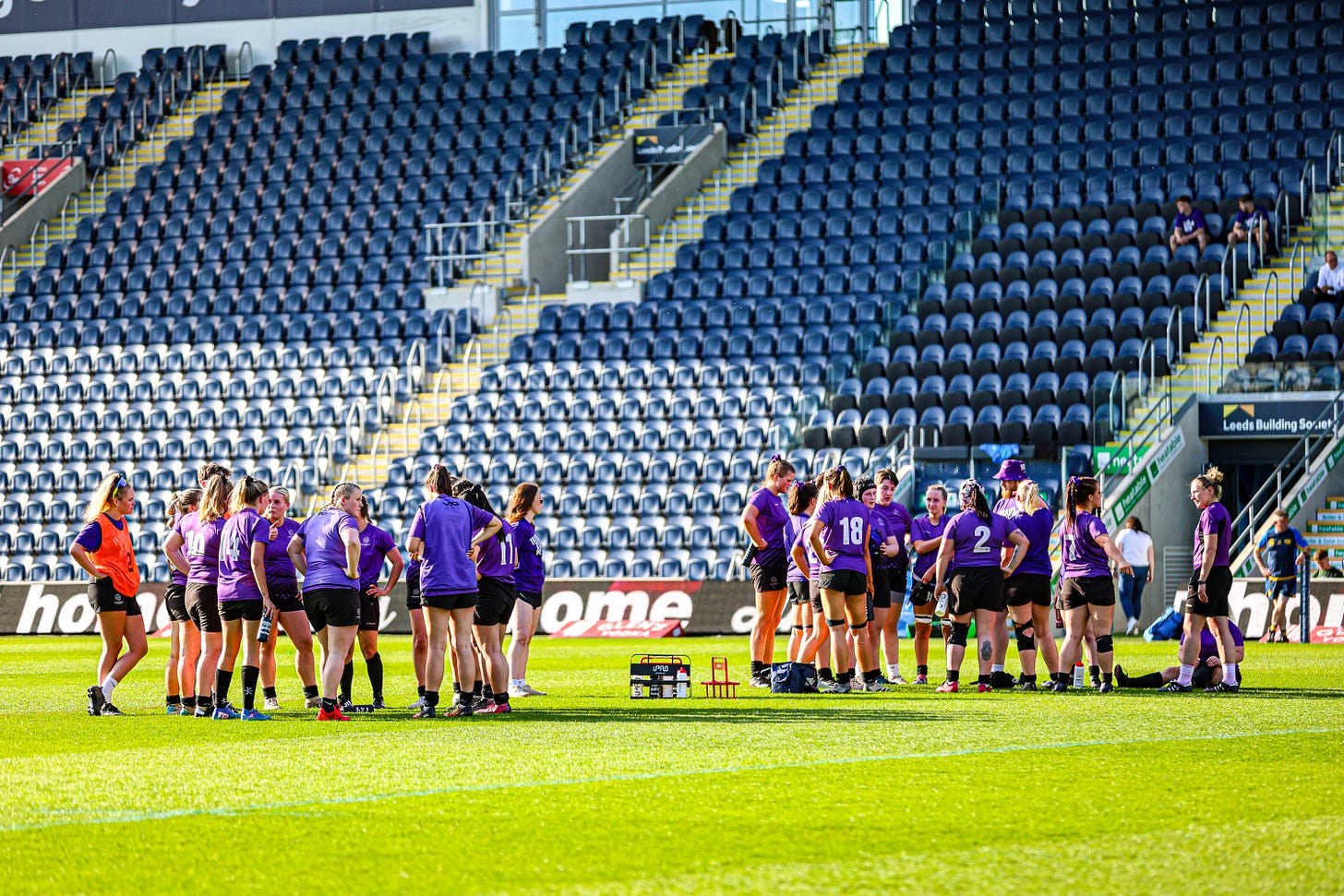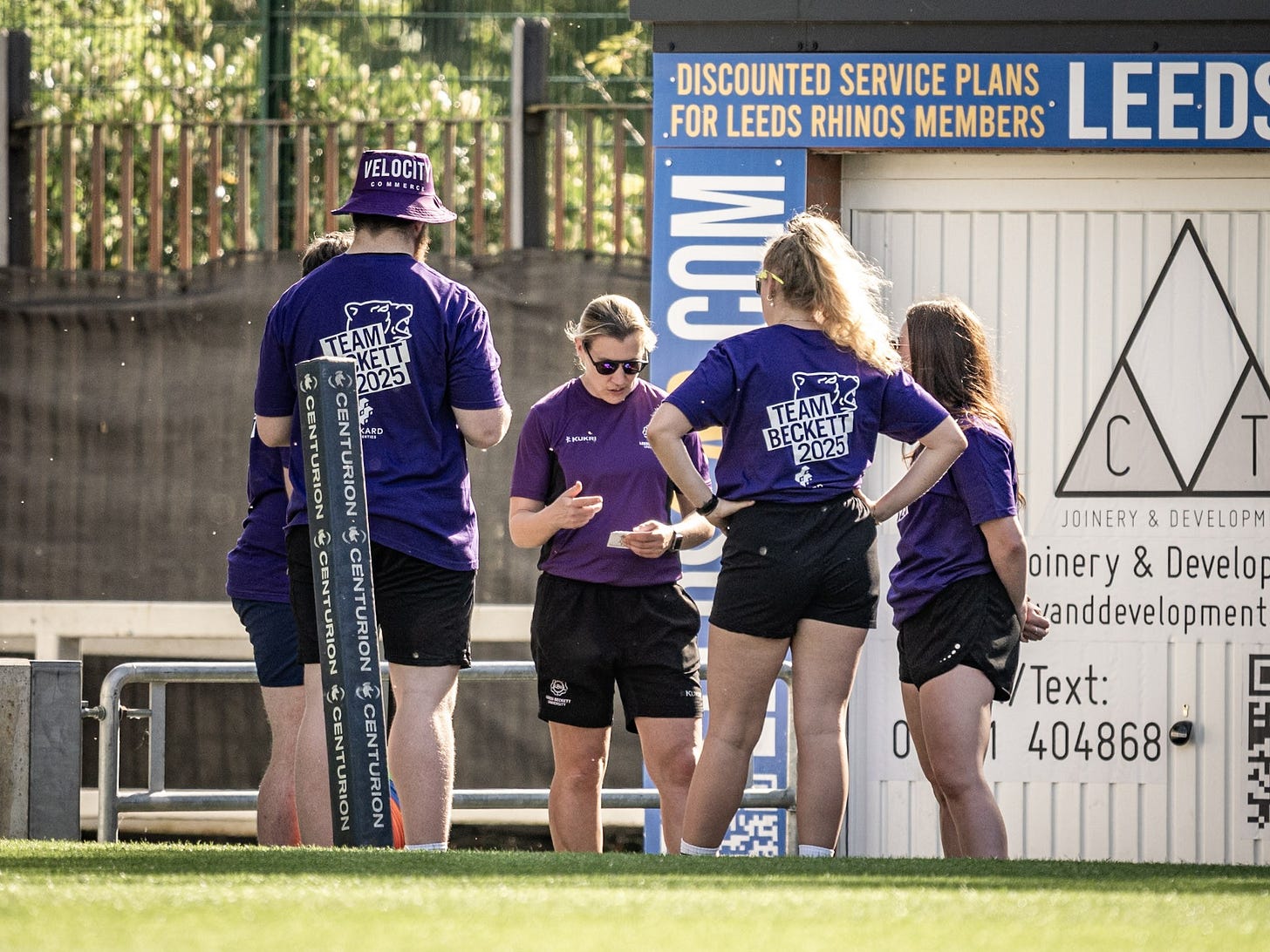Contact, coaching and coach education
Dr Anna Stodter, Senior Lecturer in Sport Coaching within the Carnegie School of Sport at Leeds Beckett University, explains her work into forming Contact Confident and some coach education tools.
I’m currently a Senior Lecturer in Sport Coaching at Carnegie School of Sport, and Head Coach of Leeds Beckett University Women’s Rugby Union programme.
In theory, coaching and lecturing go together seamlessly. Coaching has been a great way to try out lots of the things I teach sport coaching students. It means I have real-life examples at the front of my mind, which usually helps to get more complex or abstract ideas across.
It also means I can better understand the different needs and commitments that student athletes have, and how to make the most of the support the university provides to help us strike the right balance.
Lastly, combining the two has led to some really exciting research opportunities that students can get involved with.
For example, Leeds Beckett is now one of only five World Rugby ‘Laws Labs’ in the world, meaning we will get to try out new ideas for laws and see what the impact is in training.
In practice (usually logistically), sometimes coaching and lecturing don’t fit together as smoothly as they could! Our Wednesday matchdays clash with staff meetings and at the moment in the academic world, there are growing pressures on our time. That can be frustrating because with both roles, there’s always more that can be done.
Recently I’ve been doing some work looking at contact (specifically tackle) technique and how we might help coaches in this area, especially linked to head impacts, concussion, and injury prevention.
This work was inspired by seeing how these injuries happen and the impact on the players I coach, and from experimenting with different ideas in practice – such as implementing judo principles for falling and landing.
On another couple of research projects I’ve been leading, I’ve enjoyed speaking with lots of really impressive women who coach and work in rugby union from all over the world. This has been great for sharing experiences and always gives me a positive boost!
How can coaches use research?
It’s about adapting evidence and ideas to apply to your context, then experimenting and finding what works for you through reflective conversations (on your own or with another coach, mentor, or peer).
It can be tricky to know where to look for research but following researchers on social media and attending coaching conferences can be helpful for staying up to date.
World Rugby’s women’s player welfare working group and the RFU have some useful summary resources on their websites, and World Rugby’s player welfare conferences are freely available online along with some back catalogue recordings too.
I’m working on bringing together injury prevention research with what we know about coach learning. I think that researchers could sometimes build in coach learning principles to help make their work more coach friendly – anything that helps coaches see the relevance because ‘seeing is believing’.
Suggesting ways to adapt ideas for different contexts (e.g., different groups of players, levels of ability, time in the rugby season) would also be helpful.
Through some of my current research, coaches have also asked for more fun, engaging, short, and sharp content – which is no surprise given that they are typically overwhelmed with information overload and multiple pressures on their time.
It also helps if it’s accessible and ideally not hidden behind a paywall. I have tried to do this by coming up with a ‘coffee filter’ metaphor to help explain complex coach learning processes. If people want to read more, they can find it on UK Coaching’s Applied Research Journal website.
What my sessions sound and feel like
It would be interesting to find out what the players would think to it as of course, it would sound and feel different to them as it would to me as the coach.
I would say that each Leeds Beckett Women's rugby session follows a familiar structure or rhythm so that players know what to expect. It’d probably sound relatively quiet, allowing for discussion and collaboration - unless we are preparing for our varsity match when we bring along music as a bit of background noise to warm up to, mimicking what happens on game day at Headingley Stadium!
Before or at the start of training we might talk as a team about the topic of the week, which would link into our game model and our values. A good example is ‘Brave’ and exploring what bravery in defence might look like. Then we can use what we’ve come up with as something to reflect back upon throughout, such as asking how have you personally been brave in today’s session?
To me, coaching sessions feel like they go past in a flash. It’s always a struggle to keep to time especially if something is running well, but finishing on time is something that’s important to me because I hated it as a player when coaches let the session overrun!
On coach education
It’s easy to coach education-bash, and that is something that researchers have been critiqued for critiquing too much in recent years! However, I do think that now we have a better evidence-informed understanding of coach learning, coach education should be attempting to acknowledge these processes.
Moving beyond one-size-fits-all courses to work with coaches’ biography – their unique combination of prior experiences, knowledge, beliefs, and practices – would be a good starting point.
Also, filming yourself coaching and watching it back is such a powerful tool. I have used this as a way to collect data and it unintentionally worked to help coaches to learn. It is fairly easy to do now, and we could embed more of it into coach education.
There’s quite a simple activity that asks coaches to identify what they have Confirmed, Collected, or been Challenged on? These categories align nicely with my research in coach learning which found that coaches adopted, adapted, or rejected ideas they came across based on their biography.
Ideally, there would be an opportunity to work with these processes in context over time, alongside support to try new things out in practice and keep adapting in that reflective conversation cycle I mentioned earlier.
This needs skilled coach developers who have some knowledge of the people they’re supporting and how to support them, and I think there are growing numbers of better-informed people doing these roles now.
Did you know there’s a subscription option for Coaching Care Creativity? Nothing is behind a paywall so your subscriptions or coffee clicks can help keep the content going. The subscriptions are £5 a month or £50 for the year. You can also buy me a one-off coffee for just £5.




